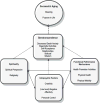Examining Life Goals of Community-Dwelling, Low-Income Older Adults
- PMID: 28926668
- PMCID: PMC5890925
- DOI: 10.3928/19404921-20170831-02
Examining Life Goals of Community-Dwelling, Low-Income Older Adults
Abstract
Self-care and self-management programs are touted as a means to age successfully. Yet, these programs pay little regard to a critical first step-the personal goals of older adults. The capacity to self-identify goals and pursue actions toward goal achievement transcends age. An examination of life goals identified by community-dwelling, low-income older adults indicates that functional performance mechanisms are valued. Maintenance of health and increased physical activity were the two most commonly identified personal goals within a sample of 161 community-dwelling older adults residing in subsidized housing. A third goal, increased socialization, aligns with relevant psychosocial factors and reflects the need to engage with others. The preferences of the older adult placed at the center of the care planning process strategically support goal attainment. Providing an opportunity to create and pursue self-selected life goals of older adults is worth consideration when developing and testing interventions designed to support successful aging. [Res Gerontol Nurs. 2017; 10(5):205-214.].
Copyright 2017, SLACK Incorporated.
Figures
References
-
- Au A, Ng E, Lai S, Tsien T. Goals and life satisfaction of Hong Kong Chinese older adults. Clinical Gerontologist. 2015;38:224–234. doi: 10.1080/07317115.2015.1008117. - DOI
-
- Bailly N, Gana K, Hervé C, Joulain M, Alaphilippe D. Does flexible goal adjustment predict life satisfaction in older adults? A six-year longitudinal study. Aging and Mental Health. 2014;18(5):662–670. http://dx.doi.org.ezproxy.neu.edu/10.1080/13607863.2013.875121. - DOI - PubMed
-
- Beverly EA, Wray LA, Chiu C, LaCoe CL. Older adults’ perceived challenges with health care providers treating their type 2 diabetes and comorbid conditions. Clinical Diabetes Jan. 2014;32(1):12–17. https://doi.org/10.2337/diaclin.32.1.12. - DOI - PMC - PubMed
-
- Bleijenberg N, Ten Dam VH, Steunenberg B, Drubbel I, Numans ME, De Wit NJ, Schuurmans MJ. Exploring the expectations, needs and experiences of general practitioners and nurses towards a proactive and structured care programme for frail older patients: a mixed-methods study. Journal of Advanced Nursing. 2013;69(10):2262–2273. doi: 10.1111/jan.12110. - DOI - PubMed
Publication types
MeSH terms
Grants and funding
LinkOut - more resources
Full Text Sources
Other Literature Sources





